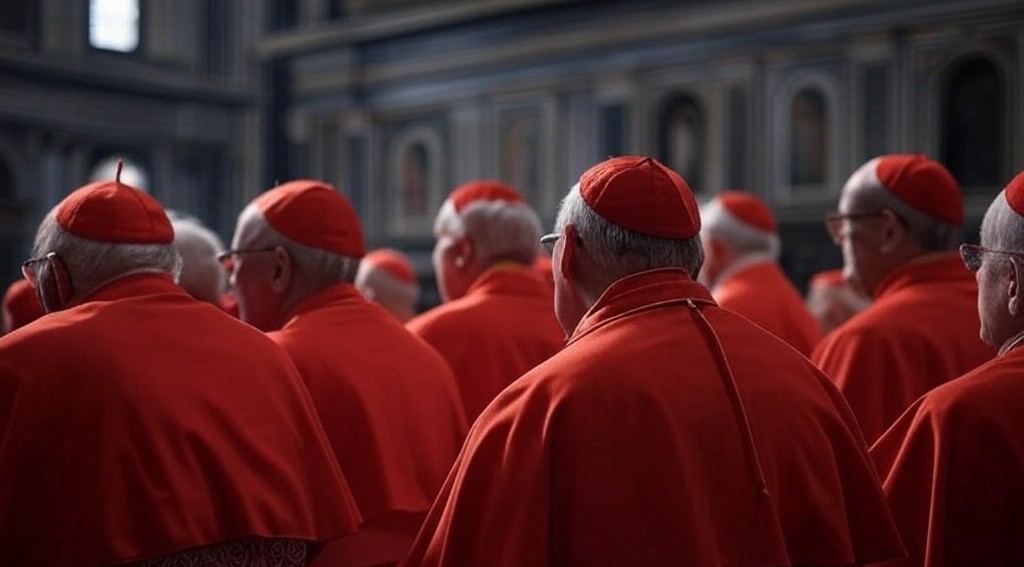We ask you, urgently: don't scroll past this
Dear readers, Catholic Online was de-platformed by Shopify for our pro-life beliefs. They shut down our Catholic Online, Catholic Online School, Prayer Candles, and Catholic Online Learning Resources essential faith tools serving over 1.4 million students and millions of families worldwide. Our founders, now in their 70's, just gave their entire life savings to protect this mission. But fewer than 2% of readers donate. If everyone gave just $5, the cost of a coffee, we could rebuild stronger and keep Catholic education free for all. Stand with us in faith. Thank you.Help Now >
Norms Concerning Applications for Priestly Formation
FREE Catholic Classes
Norms Concerning Applications for Priestly Formation From Those Previously Enrolled in a Formation Program
The National Conference of Catholic Bishops, in response to a special mandate from the Holy See contained in the Instruction to the Episcopal Conferences of the Congregation for Catholic Education of 8 March 1996 (Prot.N. 157/96) provides the following norms to assist the bishops of the United States, as well as those charged with the care of seminaries and houses of formation excepting those of Institutes of Consecrated Life and Societies of Apostolic Life, in their attention to the prescription of canon 2413. The National Conference of Catholic Bishops therefore decrees that these norms are to be followed in reviewing an application for enrollment in a program of priestly formation submitted by one who has previously been enrolled in such a program or who has belonged to an institute of consecrated life or a society of apostolic life.
Preamble
Pastores Dabo Vobis offers the theological framework for the Norms which follow:
What is true of every vocation, is true specifically of the priestly vocation: the latter is a call, by the Sacrament of Holy Orders received in the Church, to place oneself at the service of the People of God with a particular belonging and configuration to Jesus Christ and with the authority of acting .in the name and in the person' of him who is Head and Shepherd of the Church.
From this point of view, we understand the statement of the Synod Fathers: .The vocation of each priest exists in the Church and for the Church: through her this vocation is brought to fulfillment. Hence we can say that every priest receives his vocation from our Lord through the Church as a gracious gift, a grace gratis data (charisma). It is the task of the Bishop or the competent superior not only to examine the suitability and the vocation of the candidate but also to recognize it. This ecclesiastical element is inherent in a vocation to the priestly ministry as such. The candidate to the priesthood should receive his vocation not by imposing his own personal conditions, but accepting also the norms and conditions which the Church herself lays down, in the fulfillment of her responsibility.' (John Paul II, Post-Synodal Exhortation, Pastores Dabo Vobis, 25 March 1992, AAS 84 [1992], pp. 657-804, n. 35)
Purpose
A primary responsibility of a diocesan bishop is the selection and training of candidates for the priesthood. This is likewise true for those major superiors responsible not only for the religious formation of candidates, but also for the priestly formation of at least some members. In the recent past, difficulties have arisen in this area, specifically regarding applicants who previously have been enrolled in a program of priestly formation or who have belonged to an institute of consecrated life or a society of apostolic life. Decisions regarding the suitability of individual applicants require both adequate information and a reasonable procedure to follow. These procedural norms have been formulated in an effort to serve diocesan bishops in fulfilling this weighty responsibility. These norms have been written out of a respect for the inherent rights and responsibilities of bishops, for the canonical norms which are already in place, and with respect for the juridical limitations of the episcopal conference. It is our hope that the following norms will promote mutual collaboration among bishops, major superiors, seminaries and priestly formation programs out of concern for the common good. More specifically, the purpose of this document is three-fold:
- to provide a process for full disclosure of all relevant information about a candidate who had previously been in formation and who subsequently applies for enrollment in a program of priestly formation,
- to facilitate a complete and confidential exchange of information abou t the applicant's prior enrollment in a program of priestly formation or his belonging to an institute of consecrated life or a society of apostolic life,
- to establish a process wherein former bishops and major superiors of an applicant can participate in a consultative review in regard to his application.
Norms for Evaluation of Applications in These Cases
- At the time of departure from a seminary or diocesan formation program the diocesan bishop or seminary rector must inform the student by means of a written summary statement or letter of understanding that if he applies to a program of priestly formation in the future, relevant information will be communicated to the diocesan bishop, major superior, and, if necessary, the seminary rector, who is responsible for admission.
If an applicant has been dismissed from a program of priestly formation or from an institute of consecrated life or a society of apostolic life, no subsequent application will be considered in the two years following such dismissal. If the departure was other than a dismissal, sufficient time should be allotted to evaluate carefully his application and background.
Commentary:
This waiting period is intended both to assist the applicant by giving him sufficient time to deal with the issues that led to his departure and to safeguard the diocese or religious community against the unnecessary risks of a speedy readmission. Reconsideration of a decision to dismiss should rarely, if ever, be undertaken, and only if demonstrably clear and positive reasons to the contrary can be established.The applicant is to be encouraged to seek the assistance and guidance of a spiritual director during this period. Spiritual directors and confessors are urged to avail themselves of this opportunity to remind these men of the particular requisites for admission to the seminary and eventual advancement to orders, and of the special challenges and difficulties of the priestly life, especially of the need for a firm commitment to the celibate state. However, the reserved nature of the internal forum would preclude those officials making admissions decisions from inquiring of the confessors or spiritual directors regarding these matters.
- Diocesan and seminary application forms must include a question which specifically asks whether an applicant has ever applied to, been accepted or rejected by, or been dismissed from a diocesan formation program, seminary, institute of consecrated life or society of apostolic life.
- At the time of future application the applicant must permit the release of all relevant information concerning his departure from any previous program of priestly formation or institute of consecrated life or society of apostolic life to the diocesan bishop, and, if necessary, the seminary rector, to whom he is applying. This release that the applicant signs must clearly state that he:
- consents to the sharing of all relevant information from previous formation programs with the diocesan bishop or rector to whom he is applying, and
- understands that no person has a right to be accepted into a program of priestly formation.
An applicant's refusal to provide the release of all relevant information provides sufficient grounds to reject the application. Likewise, inaccurate, incomplete, or misleading information provided by the applicant also provides sufficient grounds for rejection of the application.
It may be expected that the diocesan bishop will share the information with the seminary rector and/or other seminary admissions personnel. All persons who receive and/or review this information are reminded of the confidentiality required in these matters, and of the applicant's right to privacy and to a good reputation (see CIC, c. 220). The applicant should be advised of the information thus communicated which influences the admissions process.
Commentary:
Accurate information on the previous departure from a seminary formation program or from an institute of consecrated life or a society of apostolic life is essential in evaluating a decision for subsequent admission to a seminary. Diocesan formation programs and other seminaries are encouraged to complete a final "exit" evaluation for departing students in order to have information on record regarding students at the time of leaving. This information (positive and/or negative) could be most helpful at a time of subsequent application. Once the release has been executed and received, all seminaries attended and dioceses and/or institutes of consecrated life and societies of apostolic life with which the applicant was affiliated must be contacted in written form and should, if possible, be contacted through an oral, confidential interview with those persons responsible for the applicant's formation at that time. Those contacted should provide the pertinent information in a timely manner so as not to delay the process. For the sake of an accurate account of the interview, written notes should be taken and included in the applicant's confidential, permanent file. A record of calls or inquiries received by a diocese or seminary regarding a former student should be maintained. If any such institution or person responsible is not contacted with respect to a given application but nevertheless learns of it, all relevant information should be disclosed to the proper ecclesiastical authority.
Commentary:
The authority handling the application is seriously obligated to fulfill this responsibility. "[T]hose persons responsible. . ." who should be contacted would include the major superior(s), bishop(s), vocation director(s), and rector(s) and/or dean(s) in office at the time the applicant was in formation. Action neither can nor should be taken regarding the application without this necessary information. The serious nature of this responsibility is outlined in the Circular Letter from the Congregation for Divine Worship and the Discipline of the Sacraments entitled, "Scrutinies regarding the Suitability of Candidates for Orders" (Prot. N. 589/97; see paragraph n. 8 and the introductory letter from the Pro-Prefect).- The diocesan bishop who decides to accept an applicant who was previously enrolled in a program of priestly formation or who belonged to an institute of consecrated life or a society of apostolic life must write a formal letter to the seminary or religious formation program where he is sending the applicant, with a copy to the bishop(s) of any diocese for which the applicant was previously in formation, or the major superior(s) of any institutes of consecrated life or society of apostolic life to which the candidate belonged. The letter should clearly state that:
- the applicant has been evaluated according to the norms outlined above;
- a thorough investigation of the applicant's background has been undertaken, including conversations with officials from the prior formation program in which he was enrolled including the current diocesan bishop(s) and major superior(s); and,
- it is his prudential judgment that the applicant is fit for seminary studies.
A seminary or other priestly formation program may not accept a student if such a formal letter has not been submitted by the diocesan bishop or major superior who recommends the applicant. It is understood that seminaries retain the authority not to accept students judged by their admission procedures to be unsuitable, even when such a formal letter has been received.
- If, after the evaluation of the application has been completed, the applicant is not accepted, it may be helpful for the proper authority to disclose to him the basic reasons why he was not accepted into the seminary or formation program.
In the case where the diocesan bishop has reservations about the judgment for a particular applicant, he may seek advice from the Committee on Priestly Formation.
Commentary:
In formulating his judgment, the bishop is assisted by the direction given in the Code of Canon Law, canon 241. Section one of that canon states that the diocesan bishop is to admit to the major seminary only those candidates whose human, moral, spiritual and intellectual gifts, as well as physical and psychological health and right intention show the applicant's capability to dedicate himself permanently to the sacred ministries. Section three of the same canon addresses the cases at hand, requiring the bishop to inquire into the applicant's reasons for departure or dismissal from the prior program. Furthermore, the NCCB's Program of Priestly Formation, Fourth Edition, numbers 510 through 528, gives normative regulations concerning applications for formation in this country. Notable among them for these cases are numbers 512, 525, and 526.Having considered these general prescriptions, as well as the norms presented here for these special cases, if the bishop would like further advice, the Committee on Priestly Formation stands ready to assist him with a review of the application. This review is offered in response to the request by the Congregation for Catholic Education that the episcopal conference set up "a body with the task of studying, upon request of the diocesan bishops, the eventual recourses directed to them, with the scope of providing the bishops with advice to aid their decision." The Committee on Priestly Formation clearly understands this to be a service which it renders, similar to the voluntary visitation program for seminaries. The task of this review process is to render an advisory opinion; recourse can be sought only by the accepting bishop, and the relief offered is review and advice.
This process is an integral part of the internal discipline of the Church by which it assesses the suitability of candidates for priestly formation and seeks to discern answers to what are essentially religious questions. Historically, this process has not been public; rather it has been entirely private and for that reason, confidential. An applicant has a right to a good reputation and the protection of his privacy [c. 220], so any information gained through this procedure and any subsequent review will continue to be held with the highest degree of confidentiality. The process by which the Committee on Priestly Formation might offer fraternal advice to a bishop or major superior will likewise be internal and confidential.
More Vocations

Latest Vocation News
How to Become Pope: Qualifications and the Path to the Papacy

The election of a pope is a process steeped in history, tradition, and canon law. While the vast majority of popes in recent centuries have ... continue reading
Pope Francis Names Two Secretaries-General Under Sister Raffaella Petrini

In a historic move that further elevates the role of women in Vatican leadership, Pope Francis has appointed two secretaries-general to ... continue reading
Reviving Sacred Traditions: The Vatican's School of Arts and Crafts

In a unique effort to preserve the sacred arts, St. Peter's Basilica has launched a School of Arts and Crafts to train the next generation ... continue reading
Catholic Relief Services Faces Massive Cuts: Why Your Support Should Go Elsewhere

Catholic Relief Services (CRS), one of the largest international Catholic humanitarian organizations, is facing devastating funding cuts as ... continue reading
The Nun Who Witnessed the Life and Legacy of Martin Luther King Jr

In the struggle for civil rights, the courage of Sister Mary Antona Ebo stands as a shining example of how faith can inspire action against ... continue reading
Join the Movement
When you sign up below, you don't just join an email list - you're joining an entire movement for Free world class Catholic education.
An Urgent Message from Sister Sara – Please Watch
- Advent / Christmas
- 7 Morning Prayers
- Mysteries of the Rosary
- Litany of the Bl. Virgin Mary
- Popular Saints
- Popular Prayers
- Female Saints
- Saint Feast Days by Month
- Stations of the Cross
- St. Francis of Assisi
- St. Michael the Archangel
- The Apostles' Creed
- Unfailing Prayer to St. Anthony
- Pray the Rosary
![]()
Copyright 2026 Catholic Online. All materials contained on this site, whether written, audible or visual are the exclusive property of Catholic Online and are protected under U.S. and International copyright laws, © Copyright 2026 Catholic Online. Any unauthorized use, without prior written consent of Catholic Online is strictly forbidden and prohibited.
Catholic Online is a Project of Your Catholic Voice Foundation, a Not-for-Profit Corporation. Your Catholic Voice Foundation has been granted a recognition of tax exemption under Section 501(c)(3) of the Internal Revenue Code. Federal Tax Identification Number: 81-0596847. Your gift is tax-deductible as allowed by law.












